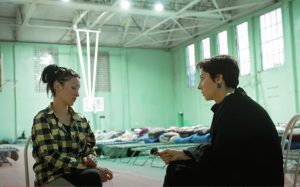London – The decision to suspend an independent Russian television channel over its coverage of the war in Ukraine causes outrage, but this time the target is Latvia, not Russia.
The country’s capital, Riga, became a safe haven for vehicles and journalists persecuted by Vladimir Putin’s government even before the invasion, but surprisingly, the electronic media regulator revoked the license of the Dozhd channel, known as Rain, on November 6.
Reporters Without Borders was one of those who were deeply saddened by the “unexplained decision”, requesting the regulator to explain the reasons for the censorship.
“The incomprehensible and disturbing decision to terminate Rain’s license in Latvia does not suit a European country that advocates freedom of the press,” said Jeanne Cavelier, head of RSF for Eastern Europe and Central Asia.
“Such censorship of an independent Russian media undermines the Latvian government’s efforts to combat Kremlin propaganda, one of its goals.
If the decision was taken in connection with the State Security Agency’s concern for ‘threats to national security and public order’, as stated in the media regulator’s official statement, it has to explain the reasons accurately.”
As a result of this decision, Rain will have to stop broadcasting in Latvia from December 8, but the channel has announced that it will continue to broadcast its programs on YouTube with more than 13 million viewers in Russia alone.
The TV channel had moved to Riga earlier this year amid the intensification of Kremlin harassment after the war with Ukraine.
TV channel does not support war with Ukraine
Despite press releases criticizing the war, Rain was accused by the Latvian editor of “possible support of the Russian armed forces”.
In addition to undisclosed information received by the Latvian State Security Service, the National Electronic Media Council (NEPLP) has cited three alleged violations since Rain TV began broadcasting from Latvia last summer, as reported by Reporters Without Borders.
First, it does not broadcast in the local language. Second, one of his reports referred to the Russian armed forces as “our army” and showed a map showing Crimea as part of Russia. mistake” was made by a journalist in the newsroom.
Finally, the regulator considered a comment made by presenter Alexei Korostelev during the live broadcast as a call to support the Russian armed forces.
In his comment, Korostelev said he hopes the channel “can help many soldiers, including basic equipment and ready-made products.”
Korostelev, who was fired for this comment, defended himself in a post on his Telegram channel, pointing to his anti-war stance, calling his comment “past” and saying it was taken out of context.
Rain TV editor-in-chief Tikhon Dzyadko apologized for the mistake on the air, noting that Rain always covered Russia’s war crimes and exposed Russian officials’ lies about the war with Ukraine.
“Rain is a media outlet that has not and does not plan to provide any support to any military,” he said.
Latvia wary of Russian journalists
Several other independent Russian media outlets, such as the news sites Meduza and Novaya Gazeta.Europe, moved to Riga after being forced to leave the country due to censorship and repression.
But according to Reporters Without Borders, some Latvian officials are suspicious of Russian journalists in exile, despite their open opposition to Vladimir Putin.
On December 2, the Minister of Defense tweeted: “I believe that Rain / Dozhd TV reporters should go to work in Russia and their residence permits should be revoked.”
Meduza, whose CEO Galina Timchenko has just been honored by the Committee to Protect Journalists for her courage to challenge Russian censorship, is leading a movement in support of Rain. There are already more than 400 signatures between individuals and organizations.
In the news program on December 6, editor Tikhon Dzyadko spoke about the decision, comparing the decision to the banning of the TV channel in Russia eight years ago.
I must say that what happened was an interesting comeback. I remember very well how eight and a half years ago I announced on the air that the TV channel in the Russian Federation was disconnected from cable networks.
Today, eight and a half years later, I am reporting the same thing, but in Latvia, where our team had to move due to the impossibility of working in the Russian Federation under military censorship due to my anti-war position, due to the Russian Federation’s refusal to wage the war against Ukraine.
Dzyadko described the national security threat accusation as “nonsense” and complains that he was not given a chance to defend himself at the 30-minute meeting of the Electronic Media Council, which made the decision.
He mocked the size of the 14-page sentence written in such a short time and suggested that he was already ready.
The editor also objected to the accusation that the channel did not understand the seriousness of the violations, noting that the dismissal of the employee who made an “unacceptable statement” showed that his action did not reflect the position of the journalism company.
He assured Rain TV channel has always been, and always will be, against the illegal annexation of Crimea, the occupation of Ukraine by the Russian Federation, and will always do everything possible to ensure that the truth about this matter is brought to the attention of as many people as possible. as many people as possible in the Russian Federation and beyond its borders”.
Also read | A film by a Russian documentary filmmaker shows scenes from the war and accounts of victims of the conflict in Ukraine.
source: Noticias
Mark Jones is a world traveler and journalist for News Rebeat. With a curious mind and a love of adventure, Mark brings a unique perspective to the latest global events and provides in-depth and thought-provoking coverage of the world at large.
